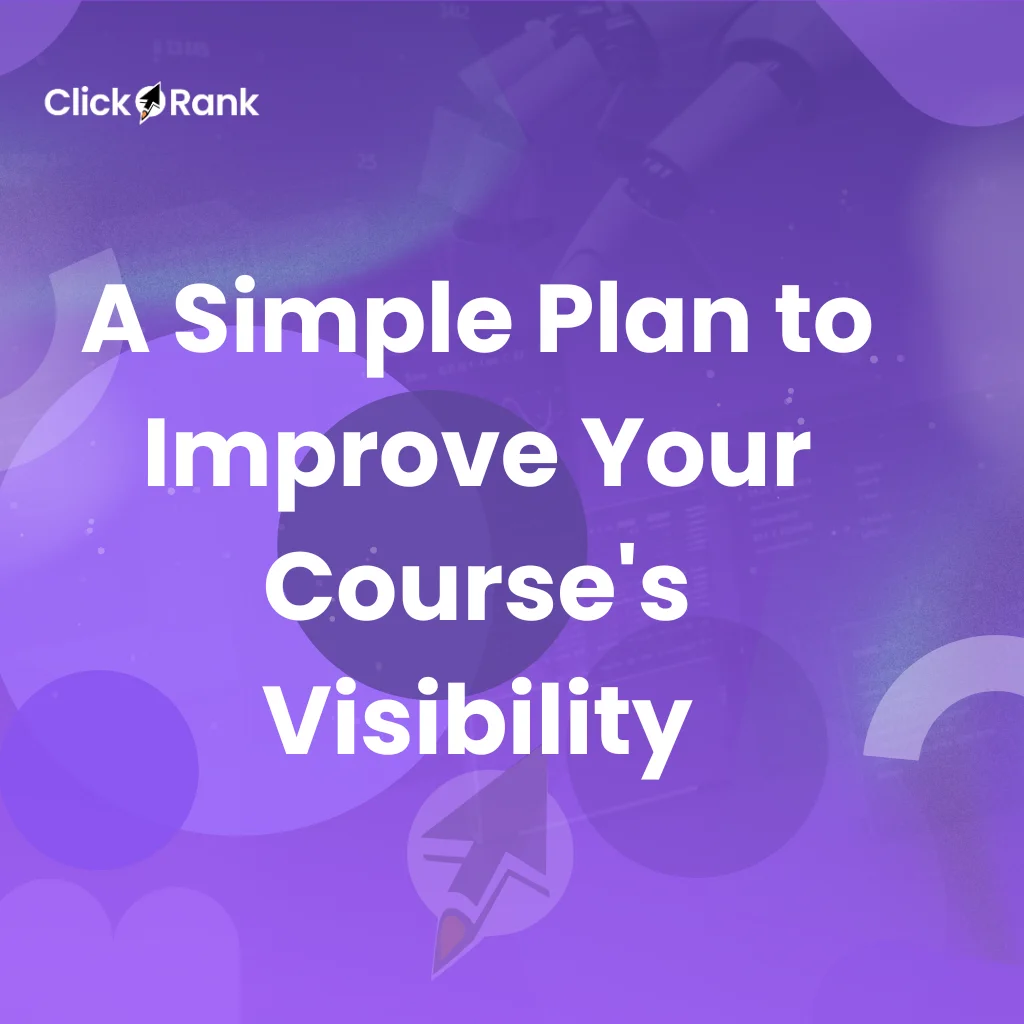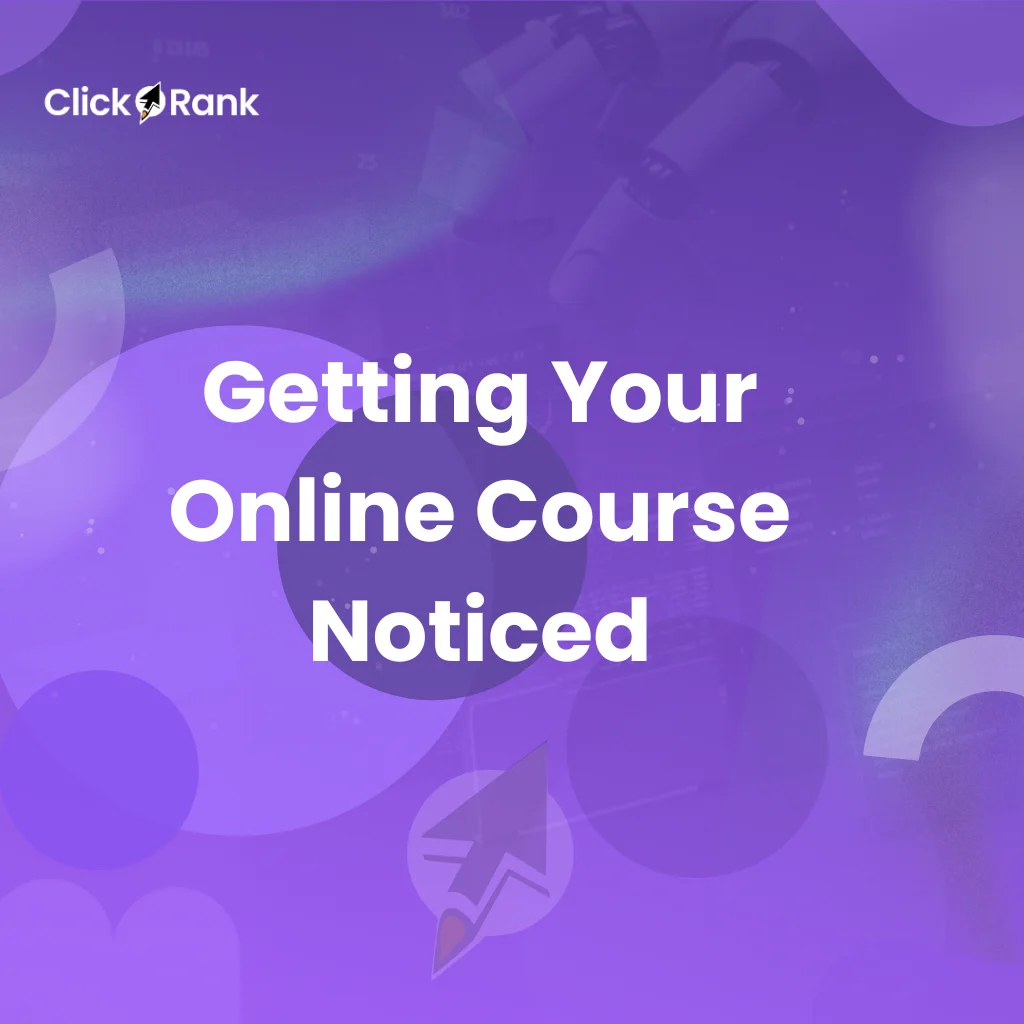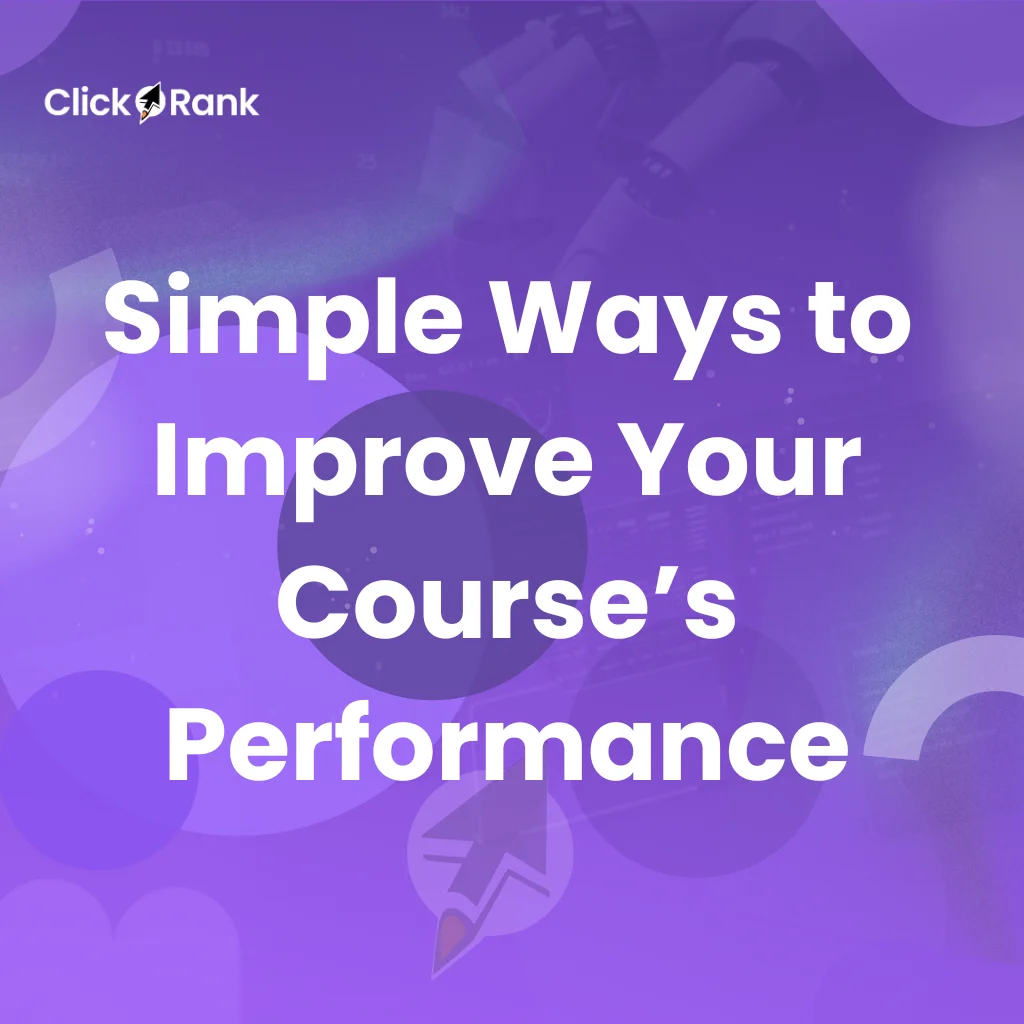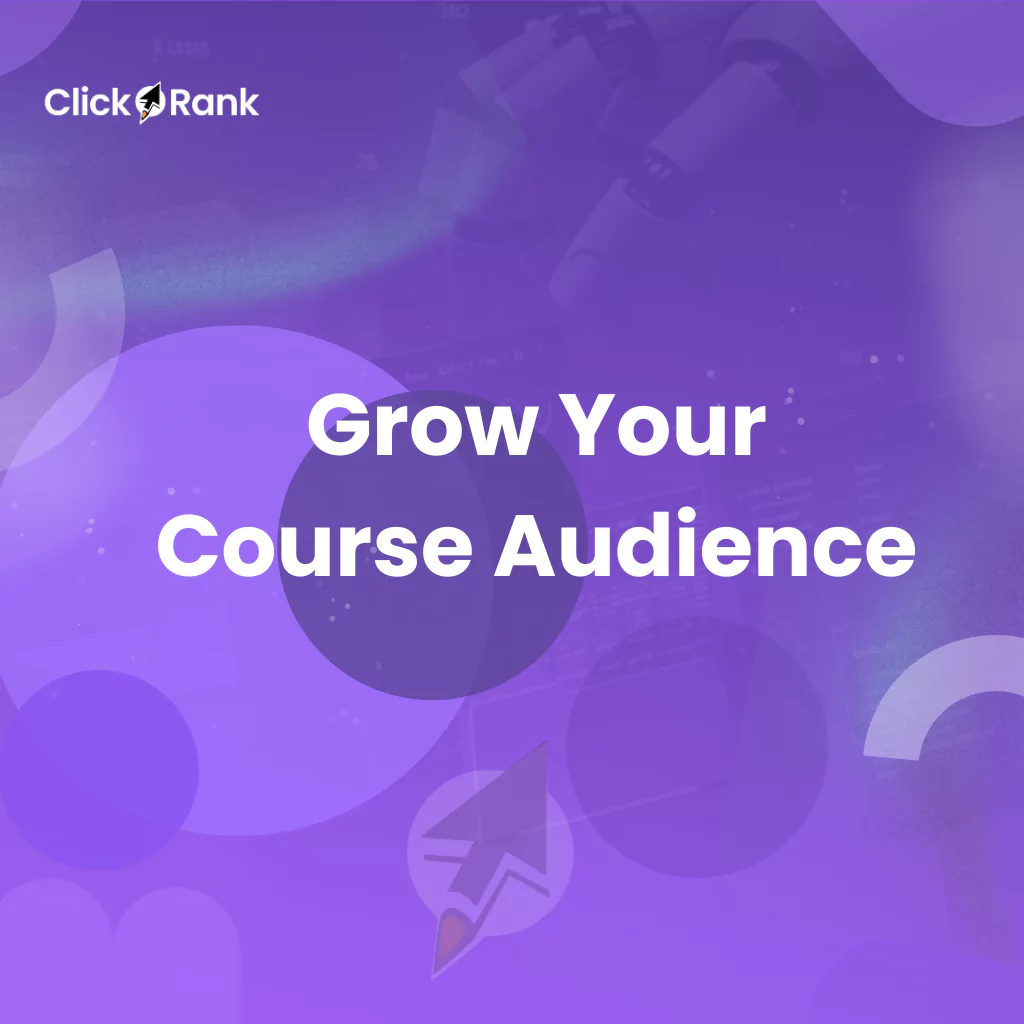Boost Your Online Course with SEO
Is your amazing online course getting lost in the crowd? You've put in the work, but potential students can't find it. This is a common problem. It's like having a great store on a street with no one walking by. The solution? Search engine optimization. With ClickRank, you can fix these issues fast and get your course in front of the right people. We'll show you how.
Why Course Creators Need to Think About SEO
Creating a good educational program is just the beginning. You need to make sure search engines like Google understand what your content is about. This helps people find your lessons when they search for a new skill to learn. We help creators focus on teaching while we handle the technical side of making their content easy to find.
Understanding the basics
We look at how people search for educational materials. They use words like "learn to code," "marketing basics," or "how to start a business." Our job is to make sure your content uses these kinds of words correctly.
Optimizing for a better student experience
SEO is not just for search engines. When you make your site clear and fast, it's also better for students. A good experience means they will stay longer and maybe buy more of your content.
The ClickRank Audit
Our fast, AI-powered audit connects to Google Search Console to tell you exactly what's wrong. It gives you a clear list of things to fix. No more guessing.
It’s all about making your lessons visible. By using the right words and having a fast website, you’re helping both search engines and your future students. ClickRank’s audit makes this process simple.
Structuring Your Course Pages for Search Engines
Each page of your learning material should be easy for both people and search bots to understand. We help you create a clear structure so search engines know exactly what each lesson is about. This means a user searching for a specific topic, like "introduction to graphic design," can find your specific lesson.
Using headers correctly
The titles on your pages (like H1, H2) tell search engines what is important. We make sure you use them correctly so your most important topics stand out.
Rich and descriptive content
The text on your pages should be detailed and helpful. Instead of just "Lesson 1," try "Lesson 1: The Basics of Photoshop Layers." This helps both students and search engines.
On-page optimization with ClickRank
Our tools automatically improve your CTRs and help with internal linking. This makes it easier for users and search engines to move through your course material and find more of your content.
A well-structured course page is a powerful tool. It helps search engines rank your content higher, which means more people can find your programs and enroll.
Using Keywords to Attract Students
When people look for educational resources, they use specific words. Using the right words is key to attracting a larger audience. We help you find and use these words naturally in your content. This makes your course materials more relevant to what people are searching for online.
Finding the right search terms
We help you understand what people are searching for. For a course on web development, they might search for "how to build a website" or "coding for beginners."
Integrating terms into your content
Once you have the words, we show you how to put them into your course descriptions, lesson titles, and video summaries. This makes your content more discoverable.
Smart Recommendations from ClickRank
Our platform gives you prioritized, actionable SEO fixes based on real performance data. We tell you exactly which terms to focus on to get better results.
Attracting more students starts with using the right words. When you use the language of your potential students, you make it easy for them to find your lessons.
Building Links and Connections
Links from other websites to yours are like votes of confidence. The more high-quality links you have, the more search engines trust your website. We help you with the technical parts of this so your course content is more likely to be seen as an authority.
Internal linking for easy navigation
Linking between your own pages (e.g., from one lesson to another) helps people and search engines navigate your course content. Our tool helps you with this automatically.
Getting links from other websites
When other blogs or educational sites link to your course, it tells search engines that your content is valuable. We help you understand how to make your content worth linking to.
One-Click Fixes for links
Our platform can automatically fix broken links or suggest better linking opportunities to make your website stronger.
Link building is about making your course content a trusted source of information. By having a good network of links, you improve your chances of getting noticed by more potential students.
Optimizing for Mobile and Speed
Today, many students use their phones and tablets to learn. If your website is slow or hard to use on a small screen, you will lose them. A fast, mobile-friendly website is a must for good rankings. Our platform checks for these issues and helps you fix them.
Why speed matters
A slow site can make students leave before they even start a lesson. It also hurts your search ranking.
Making your site mobile-friendly
We check if your course pages look good and work well on all devices, from a big computer screen to a small smartphone.
ClickRank's performance checks
Our audit tells you exactly why your site is slow and what you need to do to fix it. We give you a clear, actionable plan.
A fast, mobile-friendly site is key to keeping students engaged and improving your search visibility. Our tools make this technical part simple.
Using Video and Other Media
Online courses often use videos, quizzes, and other media. These elements can be optimized for search, too. We help you make sure that search engines can understand and rank these media files, not just your text. This gives your course an advantage.
Video SEO basics
We help you write good titles and descriptions for your videos so they appear in search results, too.
Transcribing your audio
Turning your spoken words into text helps search engines understand what is in your videos and ranks them for more keywords.
ClickRank for media optimization
We help you find and fix issues with your images and videos so they load fast and are easy for search engines to understand.
Don’t let your videos and images go to waste. Optimizing them can bring more students to your course.
Analyzing Your Progress
Knowing your performance data is key to improving. You need to know which lessons are popular and where you can improve. We connect to your Google Search Console to give you all the data you need in one place.
Checking your rankings
We help you see where your course content ranks in search results for important search terms.
Monitoring student engagement
We provide insights on which pages are getting the most visits and how long students are staying.
Automated progress reports
Our platform gives you easy-to-understand reports on your SEO performance, so you always know how you are doing.
he key to continued growth is knowing your data. Our platform makes it easy to understand what is working and what you can do to improve.
How to Boost Your Online Course with SEO
Learn how to make your online courses visible to more students with our simple, effective tips.
Why Good Course Visibility Matters
You created an amazing course, but no one is finding it. This is a common problem for course creators. Having a great course is only half the battle. You also need to make sure it can be found by people who need it. When your courses are not visible on Google, you are losing out on potential students. We help you fix this, so your hard work pays off.
Attract More Students
When your course pages are optimized, more people will find them when they search online. This helps you get more students without spending a lot on ads. We make sure your content is easy for search engines to understand, so you can attract a bigger audience.
Build a Trusted Brand
Having a strong online presence makes your brand look more professional. When your course appears at the top of search results, it shows you are an expert. We help you build this trust with automated tools that improve your site's performance.
Save Time on Marketing
Marketing a course can take a lot of time. Our platform automates many tasks, like finding broken links and improving titles. This means you can spend more time on making your course better and less time on technical work.
Get a Better Return
A good online presence means more sales. When more people find your courses, you will get more enrollments. Our platform helps you improve your visibility, which leads to better results for your business.
Boost Your Online Course with SEO
Learn how to make your online courses visible to more students with our simple, effective tips. Get a free audit from ClickRank.

A Simple Plan to Improve Your Course's Visibility
Getting your online course noticed is like making a map for search engines. It helps them guide potential students to your content. We have a clear plan to help you do this without a lot of technical work. Follow these steps to improve your online course marketing and help more students find you.
-
Optimize your content for discovery.
-
Make your website fast and easy to use.
-
Build trust through links and content.
-
Use a tool to automate the hard work.
By focusing on these key areas, you’re not just making a website for people. You’re also making it easy for search engines to find your valuable educational content and show it to the right people.
Getting Your Online Course Noticed: A Step-by-Step Guide
Making your online course popular is a simple process if you follow the right steps. This guide will show you how to improve your course's online presence, making it easier for students to find and enroll. We've broken it down into clear, easy-to-follow actions that anyone can do.
-
Optimize your website for search engines.
-
Create high-quality, helpful content.
-
Promote your course on other platforms.
By working on these areas, you will build a strong foundation for your course’s success. It’s about more than just a website; it’s about building a digital presence that attracts students.


Simple Ways to Improve Your Course’s Performance
Do you want more people to find your online course? You need to make sure your website is working well for them and for search engines. Here are three simple steps you can take to make your course more visible and help it rank higher. We focus on practical actions that give you big results.
-
Improve your page loading speed.
-
Use clear and descriptive course titles.
-
Make sure your website works well on mobile phones.
A fast and mobile-friendly website is a must. These improvements not only help with search rankings but also make the learning experience better for your students, which keeps them coming back.
How to Grow Your Course Audience
Getting your course in front of the right people can feel difficult. But there are a few simple ways to grow your audience. This section gives you an easy plan to get more eyes on your lessons. Follow these steps and watch your student numbers grow.
-
Create a blog with helpful articles related to your course.
-
Use social media to share free lessons and tips.
-
Collect student reviews and testimonials.
Sharing free information and getting good reviews from your students helps you build a strong community. This makes more people trust your course and want to join.

What can I do to make my online course more visible?
You can make your course more visible by using good words people search for, making sure your website is fast, and creating a clear structure for your lessons. We help you find and fix these things so more people can find your course.
Why isn't my course showing up in search results?
Your course may not be showing up because search engines don't understand what it's about. This can happen if you have missing descriptions, slow page speed, or no links from other websites. ClickRank audits your site to find these exact problems.
How does your tool help with my learning platform's online presence?
Our platform, ClickRank, helps by doing the hard work for you. It runs an audit on your website and gives you one-click fixes for things like missing titles or bad links. This saves you time and helps your course pages rank better.
Do I need to know a lot about tech to do this?
Not at all. We made ClickRank for people who aren't tech experts. Our suggestions are clear and easy to follow. You don't need to be a developer to get your course website to rank higher. Our automated fixes take care of the technical side.
What are some important things to optimize for my course pages?
It's important to optimize your course page titles, descriptions, and headings. You should also make sure your images have proper descriptions and that your videos have transcripts. We can help you with on-page optimization to improve all these things.
How can I see if my efforts are working?
Our platform connects to Google Search Console to show you your results. You can see how many people are finding your course and which pages are performing best. This helps you know what is working and what you need to fix next.
Ready to Get More Students?
Don’t let your amazing course get lost online. Take the first step to growing your audience with our free audit. It’s fast, easy, and will show you exactly what to fix to get more students. Try our One-Click Fixes and see the difference.